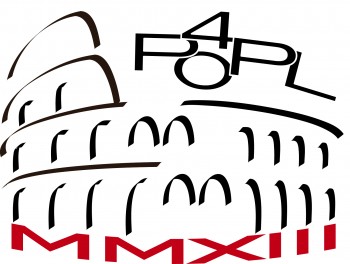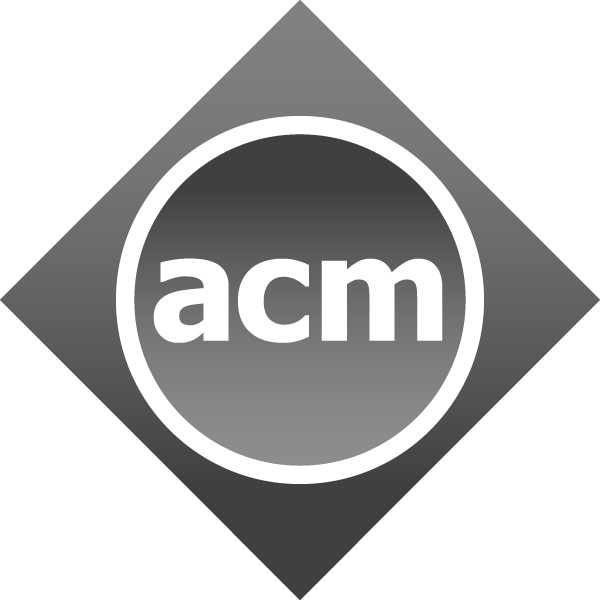
| 40th ACM SIGACT-SIGPLAN Symposium on |
| Principles of Programming Languages (POPL 2013) |
| Rome, Italy — January 23-25, 2013 |
| Call for Papers |

 |
|
 |
| Paper registration | July 6, 2012 — 11:59 pm1 |
| Paper submission | July 10, 2012 — 11:59 pm1 |
| Author response period | September 10 — 13, 2012 |
| Author notification | October 1, 2012 |
| Camera ready | November 1, 2012 |
| Conference | January 23 — 25, 2013 |
Submitted papers must adhere to the SIGPLAN Re-publication Policy and the ACM Policy on Plagiarism. Concurrent submissions to other conferences, workshops, journals, or similar forums of publication are not allowed. Submissions that do not meet these guidelines may not be considered.
The URL for submission of abstracts and papers http://popl2013.ens.fr will be opened closer to the submission deadline.
Authors will have a four-day period to read and respond to the reviews of their papers before the PC meeting. Details of the response process will be announced by email a few days beforehand.
Authors of accepted submissions are expected to transfer the copyright to the ACM and may sign a release for video of their presentation. Authors are encouraged to publish auxiliary material with their paper; they retain copyright of auxiliary material.
| Roberto Giacobazzi |
| Università di Verona, Dipartimento di Informatica |
| Strada Le Grazie 15, 37134 Verona, Italy |
 |
| Matthew Might, University of Utah, USA |
| David Van Horn, Northeastern University, USA |
| Bor-Yuh Evan Chang, University of Colorado, USA |
| Viktor Vafeiadis, MPI—SWS, Germany |
| Radhia Cousot | |
| École normale supérieure | |
| 45 rue d'Ulm, 75230 Paris cedex 05, France | |
 |
| Josh Berdine | Microsoft Research, UK |
| Sebastian Burckhardt | Microsoft Research, USA |
| William R. Cook | University of Texas, Austin, USA |
| Radhia Cousot | CNRS & ÉNS & INRIA, France |
| Nils Anders Danielsson | Chalmers U. of Technology & U. of Gothenburg, Sweden |
| Işıl Dillig | College of William & Mary, USA |
| Manuel Fähndrich | Microsoft Research, USA |
| Xinyu Feng | University of Science and Technology of China, China |
| Andrew D. Gordon | Microsoft Research & University of Edinburgh, UK |
| Manuel Hermenegildo | IMDEA Software, Spain |
| Eric Koskinen | New York University, USA |
| Xavier Leroy | INRIA, France |
| Francesco Logozzo | Microsoft Research, USA |
| Laurent Mauborgne | IMDEA Software, Spain |
| Andrzej Murawski | University of Leicester, UK |
| Peter O'Hearn | Queen Mary, University of London, UK |
| Benjamin C. Pierce | University of Pennsylvania, USA |
| Sriram Rajamani | Microsoft Research, India |
| Francesco Ranzato | Università di Padova, Italy |
| Andreas Rossberg | Google, Germany |
| Andrei Sabelfeld | Chalmers U. of Technology & U. of Gothenburg, Sweden |
| Peter Sewell | University of Cambridge, UK |
| Yannis Smaragdakis | U. of Athens, Greece & U. of Mass. Amherst, USA |
| Martin Vechev | ETH Zurich, Switzerland |
| David Walker | Princeton University, USA |
| Tobias Wrigstad | Uppsala University, Sweden |
| Kwangkeun Yi | Seoul National University, Korea |
| Alex Aiken | Stanford University, USA |
| Matthias Blume | Google, USA |
| Gilles Barthe | IMDEA Software, Spain |
| Lars Birkedal | IT U. of Copenhagen, Denmark |
| Hans-J. Boehm | HP Labs, USA |
| Avik Chaudhuri | Adobe Systems, USA |
| Swarat Chaudhuri | Rice University, USA |
| Derek Dreyer | MPI—SWS, Germany |
| Michael Emmi | Univ. Paris Diderot, France |
| Jérôme Feret | INRIA, France |
| Cédric Fournet | Microsoft Research, UK |
| Daniel Frampton | Australian National U., Australia |
| Simon Gay | University of Glasgow, UK |
| Giorgio Ghelli | Università di Pisa, Italy |
| Benjamin Goldberg | New York University, USA |
| Robert Grimm | New York University, USA |
| Vineet Gupta | Google, USA |
| Chris Hawblitzel | Microsoft Research, USA |
| Jonathan Hayman | INRIA, France |
| Michael Hicks | University of Maryland, USA |
| Martin Hofmann | Ludwig-Maximilians U., Germany |
| Ranjit Jhala | University of California, San Diego, USA |
| K. Rustan M. Leino | Microsoft Research, USA |
| Sorin Lerner | University of California, San Diego, USA |
| Francesca Levi | Università di Pisa, Italy |
| Yitzhak Mandelbaum | SEI—CMU, USA |
| Damien Massé | U. de Bretagne Occidentale, France |
| Isabella Mastroeni | Università di Verona, Italy |
| Maged M. Michael | IBM Research, USA |
| Jan Midtgaard | Aarhus University, Denmark |
| Todd Millstein | Univ. of California, Los Angeles, USA |
| Greg Morrisett | Harvard University, USA |
| Leonardo de Moura | Microsoft Research, USA |
| Andrew C. Myers | Cornell University, USA |
| George Necula | Univ. of California, Berkeley, USA |
| Tamiya Onodera | IBM Research, Japan |
| Jens Palsberg | Univ. of California, Los Angeles, USA |
| Prakash Panangaden | McGill University, Canada |
| Erez Petrank | Technion, Israel |
| Andreas Podelski | University of Freiburg, Germany |
| François Pottier | INRIA, France |
| Maurizio Proietti | CNR, Italy |
| German Puebla | Univ. Politecnica de Madrid, Spain |
| Martin C. Rinard | MIT, USA |
| Xavier Rival | INRIA, France |
| Sukyoung Ryu | KAIST, Korea |
| Francesca Scozzari | Univ. di Chieti—Pescara, Italy |
| Jeremy G. Siek | Univ. of Colorado, Boulder, USA |
| Armando Solar-Lezama | MIT, USA |
| James Stichnoth | Intel, USA |
| Eijiro Sumii | Tohoku University, Japan |
| Tachio Terauchi | Nagoya University, Japan |
| Ashish Tiwari | SRI International, USA |
| Viktor Vafeiadis | MPI—SWS, Germany |
| David Van Horn | Northeastern University, USA |
| Arnaud Venet | NASA Ames Research Center, USA |
| Janis Voigtländer | University of Bonn, Germany |
| Mitchell Wand | Northeastern University, USA |
| Eran Yahav | Technion, Israel |
| Francesco Zappa Nardelli | INRIA, France |

|

|